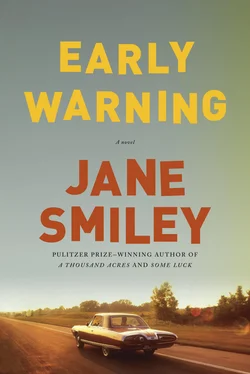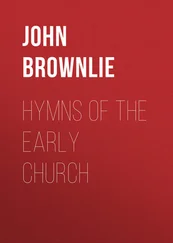Jane Smiley - Early Warning
Здесь есть возможность читать онлайн «Jane Smiley - Early Warning» весь текст электронной книги совершенно бесплатно (целиком полную версию без сокращений). В некоторых случаях можно слушать аудио, скачать через торрент в формате fb2 и присутствует краткое содержание. Год выпуска: 2015, Издательство: Knopf, Жанр: Современная проза, на английском языке. Описание произведения, (предисловие) а так же отзывы посетителей доступны на портале библиотеки ЛибКат.
- Название:Early Warning
- Автор:
- Издательство:Knopf
- Жанр:
- Год:2015
- ISBN:нет данных
- Рейтинг книги:5 / 5. Голосов: 1
-
Избранное:Добавить в избранное
- Отзывы:
-
Ваша оценка:
- 100
- 1
- 2
- 3
- 4
- 5
Early Warning: краткое содержание, описание и аннотация
Предлагаем к чтению аннотацию, описание, краткое содержание или предисловие (зависит от того, что написал сам автор книги «Early Warning»). Если вы не нашли необходимую информацию о книге — напишите в комментариях, мы постараемся отыскать её.
, a national best seller published to rave reviews from coast to coast.
Early Warning — читать онлайн бесплатно полную книгу (весь текст) целиком
Ниже представлен текст книги, разбитый по страницам. Система сохранения места последней прочитанной страницы, позволяет с удобством читать онлайн бесплатно книгу «Early Warning», без необходимости каждый раз заново искать на чём Вы остановились. Поставьте закладку, и сможете в любой момент перейти на страницу, на которой закончили чтение.
Интервал:
Закладка:
“Spoken like a bureaucrat,” said Frank, “but why did you get up?”
“Why did you get up?”
“Too many women in the house. Makes me nervous.”
“Six women under one roof is fine with me,” said Arthur. “By the way, I like what you’ve done with the entry. The slate floor. It’s appropriate to the style of the house. The chandelier is interesting.”
“Eighteen bulbs,” said Frank.
“Who changes them? It must be twelve feet off the floor.”
“It’s on a pulley. It lowers.”
“I like that,” said Arthur.
For years, Frank had cultivated indifference to personal concerns. If someone had a complaint, Frank thought, it was that person’s job to express it, but, maybe because of the influence of Minnie, he now said, “How are you? Are you all right?”
“That’s an interesting question,” said Arthur. “I’m probably better than I’ve ever been.”
“What have they got you doing?”
“Divulging top-secret information.”
“Pardon me?” said Frank.
“Well, I was so secretive for so long that now, when I talk to news reporters, they think I’ve actually told them something, because, of course, we only do it in long walks in Rock Creek Park, or in garages, where whatever we say is broken up by the sound of revving engines.”
“Are you teasing me?”
“No. Even the KGB does PR. You can only say ‘no comment’ so many times, because ‘no comment’ means ‘yes.’ ”
Frank leaned forward. “But why you?”
Arthur shrugged. “What do I know?”
“You’ve been there since the beginning. You knew about everything.”
“I thought I knew a few things,” said Arthur. “But I don’t know them anymore.”
Shock treatments. A chill ran up Frank’s spine.
—
HENRY OPENED the door of his office on the second knock. In his first office hours of the fall, he expected kids either wanting in or wanting out of one of the three classes he was teaching. Instead, there was a pleasant-looking young man carrying a briefcase, smiling and holding out an envelope. The envelope had Henry’s name on it in Gothic letters. He took it, and opened it.
My dear boy,
Please note the bearer of this missive. He is a brilliant student of mine named Philip Cross who has taken it into his head, now that your poofters have decided to riot and make their presence felt, to try his luck in the U.S. He is about to enroll in that monument to capitalism, the University of Chicago, in literary criticism. Please do not discuss any work of literature with him, as you will not understand a word he says, and it will lower your estimation of our educational system. He is, however, a young man of exceptional grace and intelligence, and I told him that you will introduce him to the mid-continental wilderness, as you so ably introduced me. I have cultivated him assiduously and I defy you to uncover his dialect roots. In addition, he is an excellent chef. Suet is his middle name.
I am, as always, your devoted,
Basil
Henry said, “Philip. Do come in.” He stepped back, and this young man (Henry thought, no more than twenty-one, no taller than five nine, but neatly made) stepped across the threshold. Henry said, “U of Chicago. Good Lord. It’s a jungle down there.”
Philip smiled, opened his mouth, and came out with the most beautiful speaking voice Henry had ever heard, as vibrant, deep, and rounded as a human voice could be. Henry said, “I’m sorry. What did you say?” Philip said, “It does seem a different world than this campus, which is very open.”
“Northwestern is a little bit of Iowa right beside Lake Michigan. It came first, you know, before the town. We take an Iowa approach in many things — for example, we approach student unrest by wondering why the students are unhappy. Down there, they just expel you.”
“Is that a warning?” said Philip.
“Are you restless?” said Henry.
“Basil would say so,” said Philip. He sat down on the windowsill.
So — the young man called his professor “Basil.” Henry said, “His letter indicates that I am not to discuss literature with you, so what else are you interested in?”
“How do you feel about these bouts of campus—”
Henry waited to hear what word he would use—“unrest”? “silliness”? “brutality”? Henry had heard dozens of words applied. His aunt Eloise, who knew the U of Chicago catalyst, Marlene Dixon, slightly and said that she was “well meaning but doctrinaire,” always talked about “campus preliminaries.” Philip said—“rebellions.”
That was nicely limiting, but respectful. He said, “Ask me in ten years. I have no idea. I suppose I am sympathetic, but from a distance. As a medievalist, I am not asked to do teach-ins, but I would if I could think of something to teach. The fate of the Cathars is not a heartening precedent. I think the military draft has been God’s gift to the left.”
Philip smiled. “I didn’t realize God gave gifts to the left, or that those gifts were accepted.”
Oh, he is a charming boy, thought Henry, and Basil was right — he might have been born at the BBC, his pronunciation was so perfect and smooth.
Just then there was a knock, and when he opened the door, Henry saw Marcy Grant, his tallest student, decked out as usual in her giant army-surplus pants held up by a string, her glasses sporting a piece of masking tape, her hair a tangle. She peered at Henry and said, “Oh, Professor Langdon,” then looked around. She smiled her brilliant smile. Someday she would stand up straight and discover that she was a lovely woman. “That’s me,” said Henry.
“I forgot to sign up for the history-of-the-language course, but I thought I had. I already wrote my first paper over the summer.” She held out some typed pages. Henry knew they would be excellent. He took them, set them on the bookcase beside the door, and said, “Come in, I’ll give you a note.”
She squinted at him, then walked through the door. Philip’s response to Marcy wasn’t even curiosity, though whether that was because Marcy was female or because she was a mess, Henry couldn’t tell. Marcy’s response to Philip, though, was gratifying. Her mouth dropped open, and she kept glancing at him while Henry wrote the note to the registrar. Henry said, “Marcy, this is Philip Cross. He’s come over from England to do grad work at Chicago. Philip, my excellent but disorganized student Marcy Grant.”
Marcy exhibited the good manners her Wisconsin mother had impressed upon her — how very nice to meet you, hope you have a good time — but she could go no further. Philip gave her his fingertips and said, “You are very kind,” as if Marcy could now be quietly executed and removed from the company of the civilized. Henry handed her the note and herded her toward the corridor. Henry eased back into the office and closed the door.
Philip had picked up Henry’s monograph, which was sitting on the windowsill, Dialectical Variations in Anglo-Saxon Epic Poetry , Yale University Press, unreviewed in any American publication, but embraced by two scholars at Cambridge, one at Oxford, and his mother, Rosanna Vogel Langdon. Henry said, “It could keep you up at night.”
Now the expected knock came, and then Rick Kingsford pushed the door open, calling, “You here, Doc? Oh, hi. How are ya?”
Henry said, “I’m fine, Rick. How are you?”
“Well, I had this cough, but it’s not so bad today. I thought I was gonna havta go to the infirmary, but not yet.” Rick was an enthusiastic student of Old English. He planned to do a translation of “The Seafarer,” with notes, as his thesis. He also carried a thermometer with him at all times and refused to shake hands. When he saw Philip, he recoiled slightly.
Читать дальшеИнтервал:
Закладка:
Похожие книги на «Early Warning»
Представляем Вашему вниманию похожие книги на «Early Warning» списком для выбора. Мы отобрали схожую по названию и смыслу литературу в надежде предоставить читателям больше вариантов отыскать новые, интересные, ещё непрочитанные произведения.
Обсуждение, отзывы о книге «Early Warning» и просто собственные мнения читателей. Оставьте ваши комментарии, напишите, что Вы думаете о произведении, его смысле или главных героях. Укажите что конкретно понравилось, а что нет, и почему Вы так считаете.











